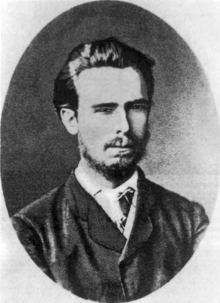Sergey Nechayev
Sergey Nechayev [1] (2 October 1847 – 21 November or 3 December 1882) was a Russian revolutionary terrorist.[2]
Sergey Nechayev | |
|---|---|
 Sergey Gennadiyevich Nechayev | |
| Born | October 2, 1847 Ivanovo, Vladimir Governorate, Imperial Russia |
| Died | 21 November or 3 December 1882 St. Petersburg, Imperial Russia |
| Nationality | Russian |
| Other names | Nechaev |
| Known for | Terrorism |
He was a leader in the Nihilist movement and known for his single-minded pursuit of revolution by any means necessary, including murder.[3]
Catechism of a Revolutionary
changeNechayev was the author or main author of a famous revolutionary pamphlet, called the Catechism of a Revolutionary. The pamphlet bears the name of Mikhail Bakunin, a well-known anarchist, but it is thought all or most of it is by Nechayev.[4] The work called for total devotion to a revolutionary lifestyle.[5] The Catechism of a Revolutionary argued that any means (including blackmail and murder) could be used to advance the cause of revolution.
It was published in the Government Herald in July 1871 as the manifesto of a secret society.[6][7]
Catechism of a Revolutionary was a program for the "merciless destruction" of society and the state. The main principle was "the ends justify the means". This became Nechayev's slogan throughout his revolutionary career.
A revolutionary is a doomed man. He has no private interests, no affairs, sentiments, ties, property nor even a name of his own. His entire being is devoured by one purpose, one thought, one passion - the revolution. Heart and soul, not merely by word but by deed, he has severed every link with the social order and with the entire civilized world; with the laws, good manners, conventions, and morality of that world. He is its merciless enemy and continues to inhabit it with only one purpose - to destroy it.[8]
Bakunin
changeNechayev and Bakunin knew each other, and Bakunin called him "my boy". All the same, Nechayev was dangerous, and Bakunin was somewhat afraid of him.[9]
Dostoyevsky
changeNechayev's ideas were the basis for Dostoyevsky's The Demons (aka The Possessed). Dostoyevsky had himself been a young nihilist, and spent ten years in a Siberian labour camp as a result. He came back a determined enemy of everything Nechayev believed. The Demons is a "dark comedy, cruelly funny in its depiction of high-minded intellectuals toying with revolutionary notions without understanding anything of what revolution means in practice".[10]
Nechayev's fate
changeNechayev planned to kill a student, Ivanov, who questioned his ideas.[10][11] On 21 November 1869, Nechayev and several comrades beat, strangled and shot Ivanov, hiding the body in a lake through a hole in the ice. The student's body was found and Nechayev fled the country before he could be arrested.
In August 1872, Nechayev was arrested in Zurich and handed over to the Russian police. He was found guilty on 8 January 1873, and sentenced to 20 years of hard labor for killing Ivanov. He died in his prison cell in 1882.
Assessments
changeIt has been said of Nechayev: "His personality and ideas portray, as if in a crooked mirror, the lust for revolution reaching even beyond political fanaticism into insanity. With Nechayev we are already beyond Lenin, [and] so criminal as to forecast the darkest incidents of Stalin".[12]
Biographers of Lenin have said that Lenin put into practice what Nechayev had taught. There is clear evidence in Lenin's own writing that this is so.[13][14][15]
References
change- ↑ Russian: Серге́й Генна́диевич Неча́ев
- ↑ Payne, Robert. 1951. Zero: the story of terrorism, chapters 1–3. London & N.Y. Wingate
- ↑ Maegd-Soëp, Carolina (1990). Trifonov and the drama of the Russian intelligentsia. Ghent State University, Russian Institute. p. 79. ISBN 90-73139-04-X.
- ↑ Leier, Mark (2006). Bakunin: The Creative Passion. Seven Stories Press. p. 232. ISBN 978-1-58322-894-4.
- ↑ Wesson, Robert (1978). Lenin's Legacy. Stanford: Hoover Institution Press, Stanford University. pp. 9. ISBN 0-8179-6922-5.
- ↑ Heller, Mikhail (1988). Cogs in the Wheel. New York: Knopf. pp. 12. ISBN 0-394-56926-1.
The Catechism of a Revolutionary, a chilling blueprint for the ideal "New Man," was the manifesto of a secret society called The People's Revenge (Narodnaya Rasprava)...
- ↑ Crenshaw, Martha (1995). Terrorism in Context. University Park: Pennsylvania State University Press. p. 72. ISBN 0-271-01015-0.
- ↑ Radzinsky, Edvard 1997. Stalin: the first in-depth biography based on explosive new documents from Russia's secret archives. ISBN 0-385-47954-9
- ↑ Confino, Michael 1974. Daughter of a Revolutionary: Natalie Herzen and the Bakunin-Nechayev Circle. London: Alcove Press.
- ↑ 10.0 10.1 Gray, John 2014. A point of view: The writer who foresaw the rise of the totalitarian state. BBC News Magazine. [1]
- ↑ Greig, Ian 1973. Subversion: propaganda, agitation and the spread of people's war. Letchworth, Hertfordshire: Tom Stacey, p8. ISBN 0-85468-495-6
- ↑ Ullam, Allan B. 1969. Lenin and the Bolsheviks. London: Fontana, p104.
- ↑ Shub, David 1948. Lenin: a biography. New York.
- ↑ Prawdin, Michael 1961. The unmentionable Nechaev: a key to Bolshevism. London, George Allen & Unwin. Argues that Nechaev was one of the greatest influences on Lenin.
- ↑ Payne, Robert 1951. Zero: the story of terrorism. London: Wingate, p42.